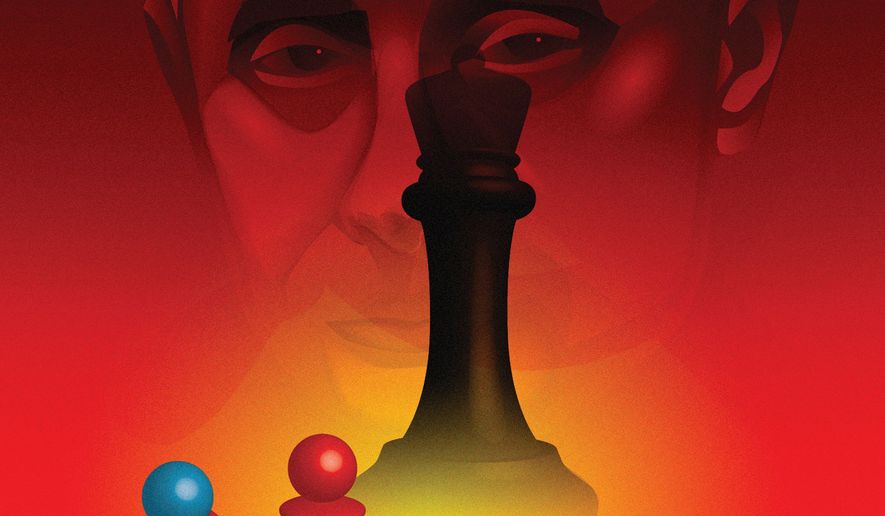OPINION:
Director CIA William Burns told a recent cyber security conference in Washington that it was “hard to see the record of the war — [Russian President Vladimir] Putin’s record — as anything other than a failure so far. … Not only has the weakness of the Russian military been exposed, but there’s going to be long-term damage done to the Russian economy and to generations of Russians.”
Meanwhile, speaking to an economic forum in Vladivostok, Mr. Putin was insisting, “We have not lost anything and will not lose anything.”
Nothing quite underscores how Mr. Putin’s “special military operation” is not going exactly according to plan as the Kremlin’s reported outreach to North Korea for artillery and Iran for drones. (North Korea is now denying the reports.) There are estimates that as many as 25,000 Russian soldiers have been killed in a barbaric war that has now lasted over 200 days, even if Russia’s Defense Ministry claims the losses are much lower.
Economically, Russia’s GDP is expected to contract by 5% this year and inflation is running at over 15%. Sanctions have severely restricted supplies of both consumer goods and technology, including vital semiconductor chips. Mr. Putin’s war-induced an exodus of Western firms as well as a domestic brain drain, with thousands of Russian high-tech professionals fleeing overseas.
In the face of a relentless Ukrainian counteroffensive, Russian units were forced to retreat from the northeast Kharkiv region, leaving behind a treasure trove of tanks, weapons and artillery. Ukraine has reclaimed as much as 2,000 square miles of territory in the east long occupied by Russian and separatist forces.
That’s why this week Mr. Putin ordered a “partial” mobilization of some 300,000 military reservists and announced plans to hold sham annexation referenda for four Ukrainian regions — so that Russia could legally claim it is fighting a defensive war on its own territory.
It looks like desperation on Russia’s part, but, as Mr. Burns rightly noted, that does not mean the KGB operative in the Kremlin has lost. Mr. Putin subscribes to Stalin’s ruthless maxim that “one death is a tragedy, a million is a statistic.” Like Stalin, who was responsible for tens of millions of deaths, Mr. Putin will burn down his enemy’s home even if it means his own will be lost as well.
All that matters to Mr. Putin is security for his regime. For him, the only way Russia can “lose” is if he is forced to relinquish his iron grip on power.
The late, last Soviet leader Mikhail Gorbachev had the unique experience of outliving his country because he refused to use violence to prevent the Soviet Union’s collapse.
Mr. Gorbachev earned a Nobel Peace Prize and the West’s appreciation, but Russia’s intelligence services vilified him for precipitating what Mr. Putin memorably called the “greatest geopolitical catastrophe of the 20th century” — the collapse of the Soviet empire.
Mr. Putin has destroyed Ukraine’s infrastructure, rained down hell on defenseless Ukrainian civilians and cemented Russia’s pivot to a troika of evil dictatorships: Iran, North Korea and China. He must be salivating over the opportunity to use his asymmetric cloak-and-dagger espionage to foment unrest in Europe this winter over rising energy prices.
The inverse of Mr. Gorbachev, Mr. Putin is using violence to impose a 21st-century update of the so-called “Brezhnev Doctrine,” which was used by former Soviet leader Leonid Brezhnev to justify military intervention to protect fellow Communist dictatorships facing populist uprisings, most famously in the crushing of the 1968 Prague Spring in Czechoslovakia.
Mr. Putin’s Orwellian propaganda machine is turning on itself. Preposterous propaganda that Ukraine is a “Nazi dictatorship” was offered as the Kremlin’s justification for invading to overthrow the government in Kyiv. Mr. Putin’s security forces and state-run media might have snuffed out any pro-democracy opposition at home, but Russia’s ultranationalist pro-war hawks have emerged as a new threat to Mr. Putin and his coterie, charging them with not being sufficiently ruthless in trying to conquer Ukraine and make it a satellite state.
Mr. Putin, who had resisted instituting a draft out of concern that admitting Russia is engaged in a full-scale war would risk domestic backlash, is not quite cornered yet. Russia still has considerable firepower and troops to keep fighting in Ukraine’s Donbas region as well as in Crimea.
But things aren’t going well for Moscow and the U.S. intelligence community now must assess how Mr. Putin will react if Russian battlefield losses accelerate, Ukraine carries on the fight for its rightful territory, and his regime’s hold on power becomes tenuous. Mr. Putin used banned chemical weapons on his enemies Sergey Skripal and Alexei Navalny; turned FSB defector Alexander Litvinenko into a human dirty bomb; and has a slew of cyber attacks on critical infrastructure, including power grids, locked and loaded. And we can never forget that Ukrainian civilians remain in the Kremlin’s crosshairs.
Mr. Putin will never relinquish control over the state as willingly or peacefully as Mr. Gorbachev did. When Russia lost wars during the 20th century to Japan in 1905 and Germany in 1917, a revolution followed. With its massive nuclear arsenal, Russia is more of a threat today than arguably ever before.
Mr. Putin may yet lose his bloody war, but the Biden administration must have a strategy to insulate Ukraine from even greater humanitarian catastrophe and minimize the risk of more devastating blowback to the region and beyond.
• Daniel N. Hoffman is a retired clandestine services officer and former chief of station with the Central Intelligence Agency. His combined 30 years of government service included high-level overseas and domestic positions at the CIA. He has been a Fox News contributor since May 2018. Follow him on Twitter @DanielHoffmanDC.




Please read our comment policy before commenting.